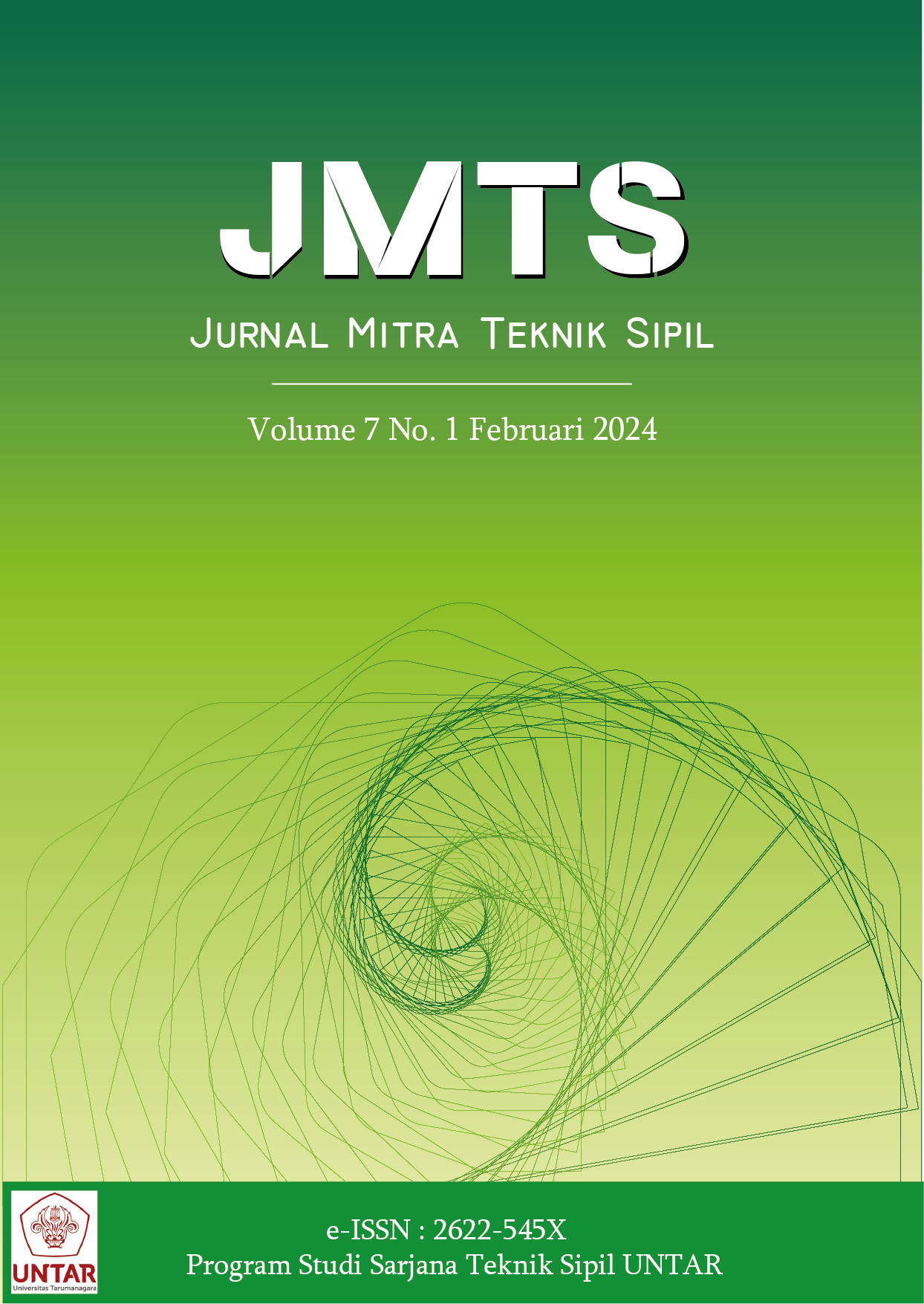PERHITUNGAN DURASI PROYEK JALAN TOL DENGAN METODE EARNED SCHEDULE
Main Article Content
Abstract
The slower-than-anticipated progress of construction projects is a common complaint in Indonesia. Several methods have been developed to address this issue, and the Earned Schedule method is just one of them. This method is derived from the Acquisition Value strategy and works by converting acquisition cost signals into operational time signals. The Earned Schedule method has a time component. The purpose of this study is to determine whether the Earned Schedule method is suitable for use in estimating the duration of toll road infrastructure projects in Indonesia. The purpose of this study is to see if there is a correlation between the median Earned Schedule and the median actual duration of the population. if checking whether the two samples come from the same population, you can use the mean difference hypothesis test. The results of this study were organized using seven unfinished and four complete sets of s-curve data. Therefore, using the Earned Schedule method, there is no statistically significant difference between the two groups in terms of final duration estimation. As a result, the Earned Schedule method can be used to accurately predict how long it will take for toll road projects in Indonesia.
Abstrak
Kemajuan proyek konstruksi yang lebih lambat dari yang diantisipasi merupakan keluhan umum di Indonesia. Beberapa metode telah dikembangkan untuk mengatasi masalah ini, dan metode Earned Schedule hanyalah salah satunya. Metode ini berasal dari strategi Nilai Akuisisi dan bekerja dengan mengubah sinyal biaya akuisisi menjadi sinyal waktu operasional. Metode Earned Schedule memiliki komponen waktu. Tujuan dari penelitian ini adalah untuk mengetahui apakah metode Earned Schedule cocok digunakan dalam memperkirakan durasi proyek infrastruktur jalan tol di Indonesia. Tujuan dari penelitian ini adalah untuk melihat apakah ada korelasi antara median Earned Schedule dengan median durasi aktual populasi. jika memeriksa apakah kedua sampel berasal dari populasi yang sama, Anda dapat menggunakan uji hipotesis perbedaan rata-rata. Hasil penelitian ini diorganisasikan menggunakan tujuh set data s-curve yang belum selesai dan empat set lengkap. Oleh karena itu, dengan menggunakan metode Earned Schedule, tidak ada perbedaan yang signifikan secara statistik antara kedua kelompok dalam hal estimasi durasi akhir. Hasilnya, metode Earned Schedule dapat digunakan untuk memprediksi secara akurat berapa lama waktu yang dibutuhkan untuk proyek jalan tol di Indonesia.
Article Details

This work is licensed under a Creative Commons Attribution-NonCommercial-ShareAlike 4.0 International License.
This work is licensed under Jurnal Mitra Teknik Sipil (JMTS) Creative Commons Attribution-ShareAlike 4.0 International License.References
Al-Hazim, N., Salem, Z. A., & Ahmad, H. (2017). Delay and Cost Overrun in Infrastructure Projects in Jordan. Procedia Engineering, 182, 18-24.
Anondho, B. (2018). Pengembangan Model Prediksi Durasi Probabilistik Proyek Pembangunan Gedung Bertingkat Tinggi Berbasis Faktor Pengaruh Eksternal Terukur. Disertasi, Universitas Indonesia .
Anondho, B., Latief, Y., Rarasati, A. D., & Mochtar, K. (2017). Probabilistic Construction Project Duration Prediction Models for High Rise Building Based on Earned Schedule Method in Jakarta. International Journal of Innovation, Management and Technology, 8(5), 477-481.
Grigg, N. (1988). Infrastructure Engineering and Management. John Wiley & Sons.
Khamooshi, H., & Abdi, A. (2017). Project Duration Forecasting Using Earned Duration Management with Exponential Smotthing Techniques. Journal of Management in Engineering, 33(1), 04016032.
Kim, B.-C., & Kim, H.-J. (2014). Sensitivity of Earned Value Schedule Forecasting to S-Curve Patterns. Journal of Construction Engineering and Management, 140(7), 04014023.
Lipke, W. (2011). Earned Schedule Schedule Performance Analysis from EVM Measures. Projects and Profits Magazine, XIII(1), 1-15.
Lipke, W., & Henderson, K. (2006). Earned Schedule an emerging enchancement to EVM.
Lipke, W., Zwikael, O., Henderson, K., & Anbari, F. (2009). Prediction of Project Outcome: The Application of Statistical Methods to Earned Value Management and Earned Schedule Performance Indexes. International Journal of Project Management, 27(4), 400-407.
Moselhi, O. (2011). The Use of Earned Value in Forecasting Project Duration . 28th International Symposium on Automation and Robotics in Construction, (hal. 689-693). Seoul, Korea.
Mubarak, S. (2010). Construction Project Scheduling and Control. John Wiley & Sons.
Vanchoucke, M., & Vandevoorde, S. (2006). A Simulation and Evaluation of Earned Value Metrics to Forecast the Project Duration. Journal of The Operational Research Society, 58, 1361-1374.
Vanhoucke, M., Andrade, P., Salvaterra, F., & Batselier, J. (2015, February). Introduction to Earned Duration . The Quarterly Magazine of the College of Performance Management, hal. 15-27.
Wicaksono, Y. (2007). Seri Solusi Bisnis Berbasis TI: Aplikasi Excel dalam Menganalisis Data. Jakarta: Alex Media Komputindo.



